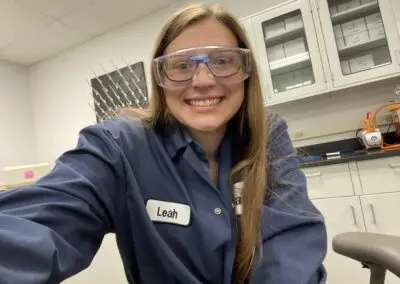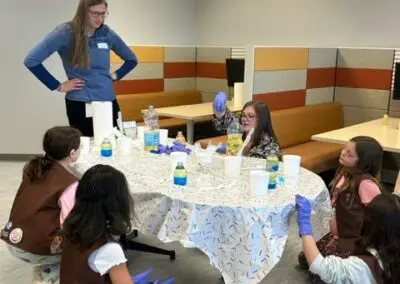On Thursday November 2 our Chats with Change Makers student host Kavya got to interview Leah Baker, a chemical engineer with Cargill and the Society of Women Engineers (SWE).
Chats with Change Makers is designed to showcase real engineers, technologists, and technicians to students from grades 4-8 and make real world connections to the engineering profession, as well as reflect the diversity of the students who participate!
You can watch the full interview below, but here are some of our favorite bits!
Question: In what ways do you think your job encourages you to be a change maker?
Answer: I’m a chemical engineer, but I currently sit on the sales team. So I talk with customers about our products and the science behind them and help them sort out their problems. And I think my job specifically positions me to be a Change Maker because I know about the science.
I love science and engineering. But I also have to tell people about it. I feel like I get to bridge that gap between people who don’t come across science all the time and aren’t constantly thinking about, ‘What is my phone case made out of? How does my car stick to the road?’ Like the science themed thoughts that I might have.
But to bring science to new audiences is a skill that I think I’ve developed in my job and something that my job enables me to do and get better at all the time. And I think that definitely connects with our conversation today because we’re also trying to share the possibilities and engineering with more people.
Question: And we have an audience question from Ryan. How do you recommend learning about different engineering fields in middle and high school?
Answer: Well there’s a ton of resources out there now, I mean, you’re listening in to Discover E’s Chats with Change Makers! This is an incredible way to learn more.
But if you really want to dig in and go a little deeper, I don’t know if any of you have watched Nova on PBS. It’s just a science show on, the public broadcasting station, and that show played a big role in me deciding to pursue engineering. I was just so excited by all the different people and work and every time I hear the theme song my heart rate like still increases. It’s like, “Oh, what am I going to learn?”
So if you if you don’t have the resources to go out and do something hands on. I recommend checking out that show and see if something speaks to you. DiscoverE clearly has lots of lots of opportunities, but also as a student. You have immense power. Anyone that you want to reach out to, you can probably find their emails or ask an adult to maybe help you find them on LinkedIn.
Not sure if you’re found that resource yet. I know you’re not probably networking yet, but if you reach out to any professional, any scientist or engineer, maybe there was a lab you really wanted to tour; I have never heard someone say no, especially when you are in high school or middle school or even younger, you have some crazy power if you if you’re not afraid to ask.
So there’s some pretty cool opportunities that you can create for yourself as well as find some existing ones. Definitely. And we live in such a digitally driven world. So everything’s just one click away. And I think that works well for a lot of students who want to explore more.
Question: We have another audience question, a middle school class in Virginia, and they wanted to know, what is the starting salary of a chemical engineer?
Answer: Yes, so there’s kind of a variety depending on what industry you go into. I would say on average, maybe 75,000 to 80,000 a year. And like I said, that can shift if you go into graduate school, it might be lower to start. Or if you go into oil and gas, that can be more lucrative, if you’re looking for that.



